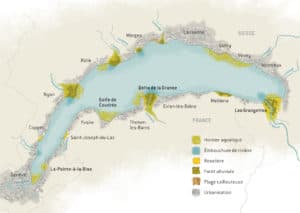Did you know?
DUCK FLEAS
Duck fleas" are a natural phenomenon, unrelated to pollution.
Even on a beach with impeccable bacterial hygiene, there can be a risk of "bather's dermatitis" or "duck flea", particularly in shallow, vegetation-rich waters with temperatures above 20°C, where it's advisable to limit bathing. This dermatological condition is caused by the larvae of a duck parasite that penetrates the human epidermis and causes severe itching, fortunately not serious.
To prevent the rash from appearing, shower immediately after bathing and rub vigorously with a towel. If the rash does appear, avoid scratching to prevent secondary bacterial infections. The rash disappears without a trace in 10 to 20 days.
WATER QUALITY ANALYZED BY THE AUTHORITIES
Bathing water under control!
The quality of bathing water on Lake Geneva beaches is classified on the basis of bacteriological analyses carried out during previous bathing seasons by the competent authorities in each canton and department. When a beach is temporarily polluted for special reasons, the authorities inform the public.
The authorities base their classification on :
- in Switzerland (Vaud, Valais, Geneva): based on the Recommendations concerning the analysis and assessment of bathing water quality (lakes and rivers) issued by the FOEN and the FOPH (2013);
- in France (Haute-Savoie): on Directive 2006/7/EC of the European Parliament and of the Council of February 15, 2006.
LEMAN'S NATURAL ENVIRONMENTS
The shores of the lake offer a diversity of environments that are home to a rich and varied flora and fauna: alluvial forest, river mouth, stony shore, reed bed or aquatic meadow, to name but the most important.

Of course, everything in water is connected. On the other hand, the artificialization of riverbanks over the past two centuries with riprap, walls, quays, harbours and roads has greatly reduced the number of natural sites and fragmented them.
The result? Habitats are weakened, as are the species that take refuge in them. We urgently need to preserve those that remain.
The reed beds of Lake Geneva: a rare and fragile natural jewel discovered by Fabwildpix and a few precautions to take if you paddle:
AQUATIC VEGETATION
With youtuber Fabwildpix, discover macrophytes, those often misunderstood lake grass beds that are often confused with algae, as well as the living species that inhabit the depths of Lake Geneva.
WHERE TO FIND OUT MORE ABOUT WATER QUALITY?
Vaud: Department of Consumer and Veterinary Affairs (SCAV)
+41 (0)21 316 43 43
Valais: Department of Consumer and Veterinary Affairs (SCAV)
+41 (0)27 606 49 50
Geneva: Geneva Environment
+41 (0)22 546 76 00
Haute-Savoie: Regional Health and Environment Agency
+33 (0)4 72 34 74 00
